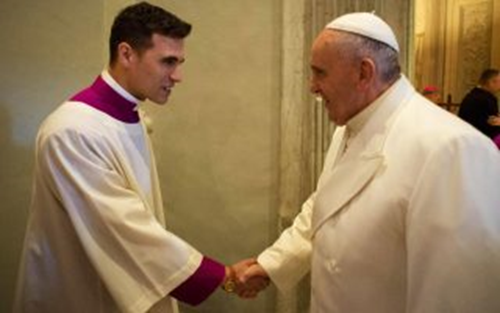My mother said that many times. It might be an old Irish warning before they broke out the whiskey at the wake.
OK, but I am not going to join the chorus of praise for the pope emeritus either. And it has begun in full force. I will bet money that the cause for his canonization has already been written and is a foregone conclusion. He was probably not the pernicious conservative rat that the neo-libs want to portray, but he was no angel. He loved his cats, so not all bad, but he was a little too gay for most conservatives. There might be a fight between cat lovers and opponents of those crazy red pumps.
I just listened to an interview with the neo-conservative George Weigel
https://www.youtube.com/watch?v=x-B24f34jUU. He talks about the bromance between John Paul 2 and Ratzinger. According to Weigel, this is the heart of their argument: “The Council had really been the work of the holy spirit, but its implementation had been less than satisfactory because it had not been properly understood. It was not seen in the context of the church’s settled tradition.” So they set out to give the Council an authoritative interpretation. Their contention was that the Council was not a paradigm shift; it was not starting the catholic church over again.
This is my view. When the fathers in charge surveyed the work of Vatican 2, and realized that it spelled the end of the monarchy that their power and livelihood depended on, they began the process of limiting the damage. Paul 6 was the harbinger. Still in the thrall of John 23, he was neither a visionary nor a strong man; either would have been a disqualifier for the enclave that elected him. John Paul 1 may or may not have unleashed a hornet's nest by starting an audit of the finances of the Holy See, and he didn’t live long enough to even really begin the work. However the scare was enough to propel the unlikely, and extremely conservative Wojtyła to almost 3 decades of fomenting and leading a backlash, hounding Arrupe and all the liberal Jesuits who were involved in social action and, god forbid, liberation theology, the list goes on, but he had an amazing team of supporters, Subito Santo. He anointed the man who just died to continue the work of “reinterpreting” Vatican 2.
I was elated when Ratzinger resigned. He lived on and had a nice retirement. But my gut feeling is that he became a kind of Silenced Saint. Support for an all-powerful papal monarchy has become more entrenched, and perhaps even increased. Look at how tired and worn out Francis looks after 10 years.
How much support could we gather for a “Get back to Jesus” movement in the Roman church? Well, at least Ratzinger is no longer available to write a compelling list of reasons against it while pretending that it’s already in place.
The word for the day is “bowdlerize,” as in he was great if we can just cut out the offensive parts, or why in hell didn’t he consult the damage control consultants beforehand? Here are some of my favorite bits from the life of Ratzinger et al:
Regarding the rehabilitation of neo-Nazi Bishop Richard Williamson of the Society of Pius X by lifting his excommunication. https://truthspinners.blogspot.com/2009/02/problem-with-benedict.html
And moving right along, his pandering to sex abusers mixed in with his nifty red slippers, https://truthspinners.blogspot.com/2021/07/no-sackcloth-and-ashes-for-these-guys.html
Francis is not going to win the cold hearts of the neo-con's with this less than regal pic.
